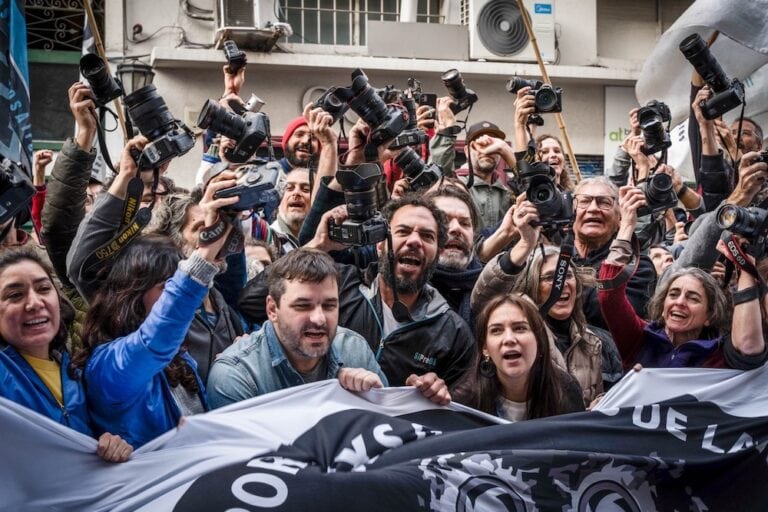FOPEA is concerned over restriction in the distribution of the "Rumbos" magazine insert in the province of San Juan.
(FOPEA/IFEX) – FOPEA is concerned over the restriction in the distribution of the “Rumbos” magazine insert on Sunday, 7 June 2009, in the province of San Juan. On that day, “Rumbos” was not distributed with the daily “Diario de Cuyo”, the main morning newspaper in San Juan which publishes 22,000 copies on Sundays. The magazine was also missing from 200 Sunday edition copies of the Mendoza-based magazine “Los Andes” that are also sold in San Juan. “Rumbos” is included in the Sunday edition of newspapers in 17 provinces in Argentina. The front page story of the edition of the magazine that was not distributed covered issues relating to mining in Argentina.
Local and regional media outlets attributed the absence of the magazine to pressure exerted by both the Barrick Gold company, which is carrying out mining activities in San Juan, and the government of San Juan, although the government claimed that it was not involved. Rodrigo Jiménez Castellanos, the vice-president of corporate affairs for Barrick South America, told FOPEA that the company could not comment on the issue “because it is about an incident that took place outside of company operations.”
In a 10 June editorial, “Diario de Cuyo” said that it had exercised its right to refrain from publishing incomplete information for which it would later be held responsible. It went on to say that it did not distribute the magazine because it included “hasty conclusions that could have generated public alarm (. . .) without having consulted all the sources involved” and “it did not meet professional standards for journalism, such as consulting a number of sources, pluralism, and a visit to the area of the events in question before arriving at a conclusion.” “Diario de Cuyo” editor Francisco B. Monte said the magazine was not circulated “because of a contractual problem with ‘Rumbos’ relating to a lack of advertising with small newspapers that do not belong to the company that publishes ‘Los Andes’, ‘La Voz del Interior’, ‘El Liberal’ or ‘Río Negro’.”
“Rumbos” editor Sergio Serrichio said that “Diario de Cuyo” had a copy of his magazine on the Thursday before it was to be distributed and that the daily did not warn personnel at the magazine that it would no be circulated. In addition, he said that he made several attempts to contact the daily’s directors to discuss what took place but they did not respond. He added that “Diario de Cuyo” collaborated with the editors of “Rumbos” in the development of the article in question, providing sources, contacts and information in general, and that the magazine’s personnel were not questioned about the article’s contents.
With respect to the failure to circulate “Rumbos” in “Los Andes”, the daily’s editor, Arturo Guardiola, told FOPEA that it is not clear whether the magazine was not delivered with any of the 200 copies that are sold on Sundays in San Juan since those responsible for the distribution have not provided a full explanation of what took place. The San Juan Newspaper Vendors Union (Unión de Vendedores de Diarios de San Juan) has said that the “edition left the ‘Diario de Cuyo’ printers without the magazine. In ‘Los Andes’ we insert ourselves, but what could have happened is that the vendors at the stalls took it out of ‘Los Andes’ to put it in ‘Diario de Cuyo’ when their clients asked for it.” The Newspaper and Magazine Distributors Association (Asociación de Distribuidores de Diarios y Revistas), however, said that the magazine was never delivered to the vendors.
The article that lead to the restriction in circulation of “Rumbos” in San Juan can be viewed at the following link: http://www.diariolibre.info/imagenes_notas/revista_rumbos/DairioLibre_info-Revista_Rumbos_Censurada_San_Juan.pdf .
FOPEA calls on the San Juan authorities to ensure pluralism in information in the province. The organisation also urges media outlets and journalists to respect freedom of expression and refrain from limiting the circulation of information that may not coincide with their own opinions. FOPEA’s work consists of ensuring that freedom of expression is respected. The “Rumbos” article in question touched on one of the most controversial issues in San Juan and, as such, the organisation is concerned that the failure to circulate it could represent an act of “prior censorship”.


